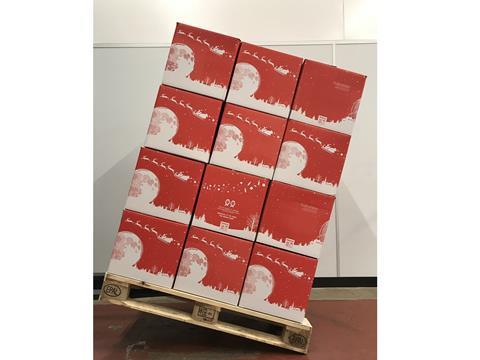
Adhesive pallet stabilisation saves money, cuts waste and avoids damage during transportation and storage, according to Protek Packaging, a leading supplier of hot melt systems that are designed for protecting goods in transit. Pallets then remain unitised after removing wrap, reducing the risk of potential accidents caused by products falling from high rack storage.
The adhesive, which can be recycled, is accurately applied by hot melt systems to the corners of cases, cartons or bags during stacking, reinforcing load integrity, saving customers on average a 10th per pallet compared to stretch plastic wrap, with potential savings on disposal costs of up to 70% as stretch wrap is normally sent to land fill.
Hot melt systems have functions to bead, swirl or spray patterns that meet specific product shipment or storage conditions, boast simple-to-use controls for precise pumping, dispensing and cut off to make the operation easy and reliable. The adhesive maintains stability on partial and mixed pallets, even when restacked.
While accepting that there is still a place for stretch wrap in packaging, for instance to prevent issues like products getting wet, Protek Packaging’s Managing Director, Eamonn Talbot, is convinced that almost anyone using the material for securing pallets, such as food and drinks manufacturers, can make significant cost savings as well as putting less plastic into the supply chain.
He said: “Typically manufacturers can reduce stretch wrap by around 70%, leaving enough to give products a dust or shower resistance – the main strength of holding the pallet together can come from the adhesive. Even for supermarket deliveries companies can minimise the amount of stretch wrap required, even if they do not want to eliminate it.”
An adhesive pallet stabilisation system is easy to install at the side of a production line without any disturbance or downtime. It is standalone equipment which can be up and running within a couple of hours, applying adhesive in minute quantities onto cases.
Eamonn added “We have demonstration equipment which can be trialled at our works or a customer’s site. We’ll make up some pallets for testing and put them on the customer’s vehicles for a few round-robin trips before coming back to their depots for de-palletisation, where customers can check for themselves if the load has moved.”
Protek Packaging has been supplying spare parts and service plans for adhesive equipment since it was established in 2004. The company now also provides European-made gluing systems to a range of industries and says businesses also need to weigh up the cost of disposal to those receiving goods in plastic film.
It only takes a small amount of adhesive applied to the top surface of items prior to being palletised to provide a non-stick surface area that is not going to bond or tear the items. Every product stacked up on the pallet will be secured with the glue, stopping goods from moving if the pallet is tipped up at an angle or if the vehicle is bouncing across potholes.
The load is locked together and depending on the products to be palletised – it could be large sacks to small cartons and cases – different types of adhesive and the volume applied can be adjusted to suit the customer’s requirements.













